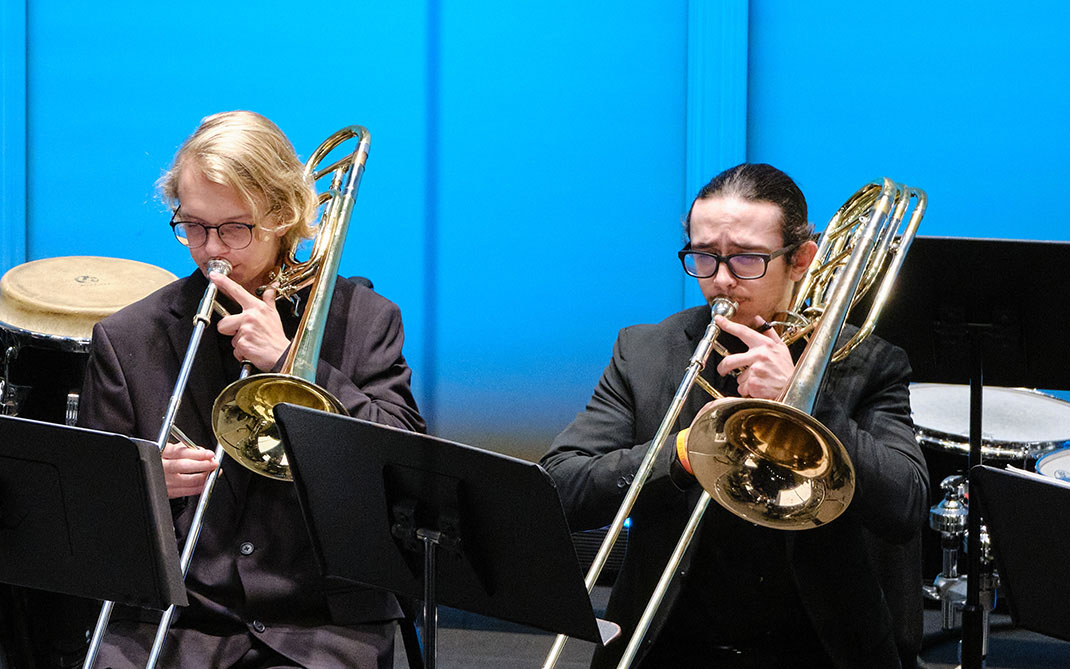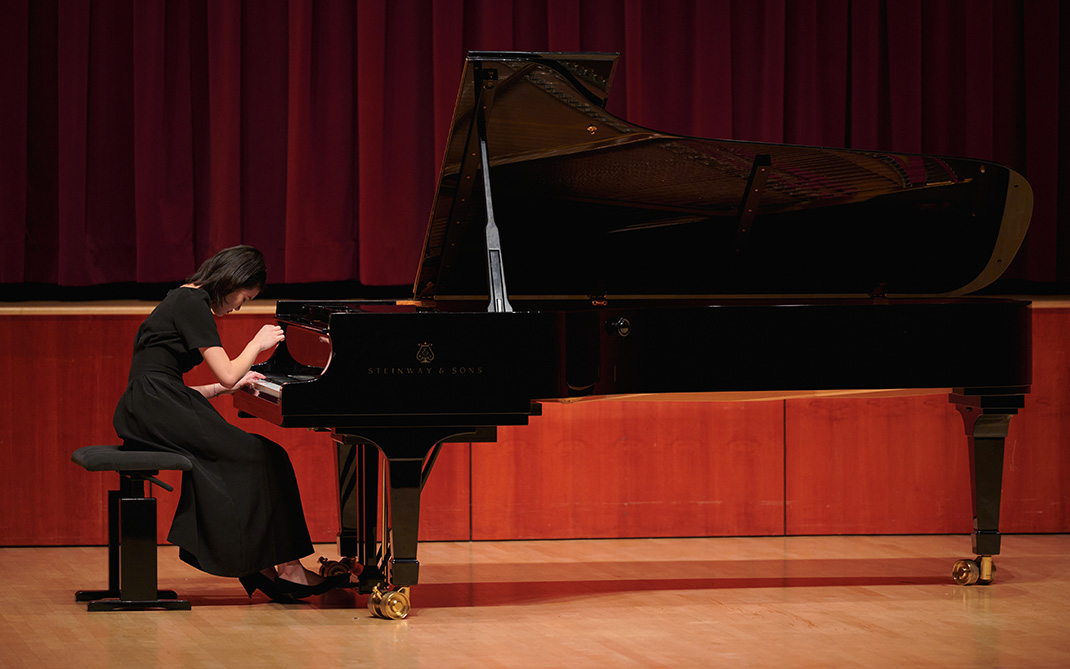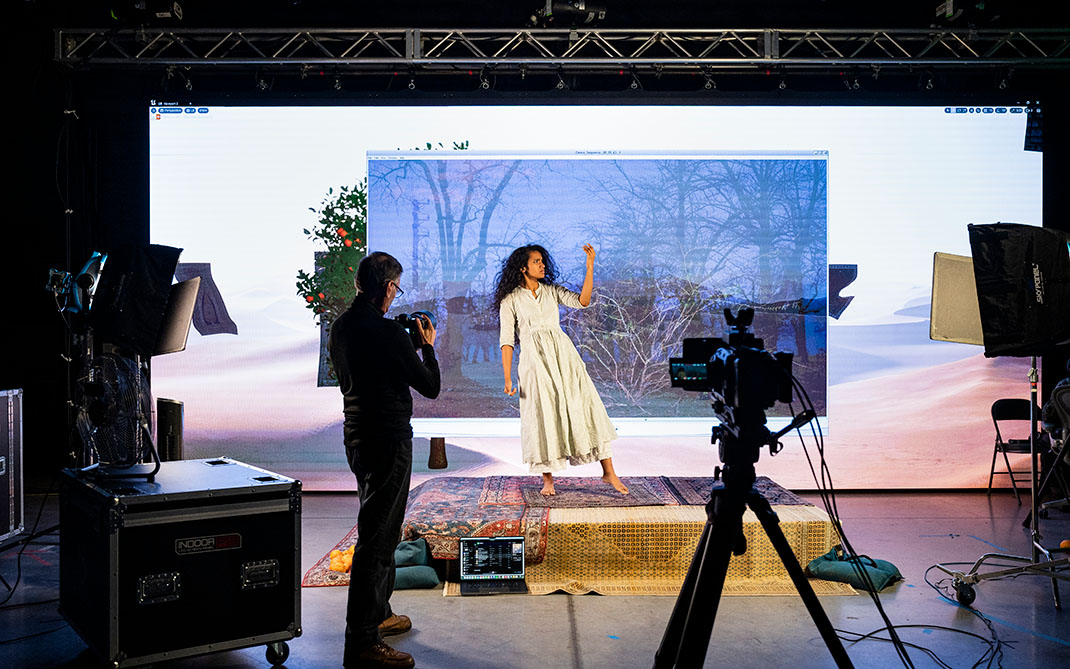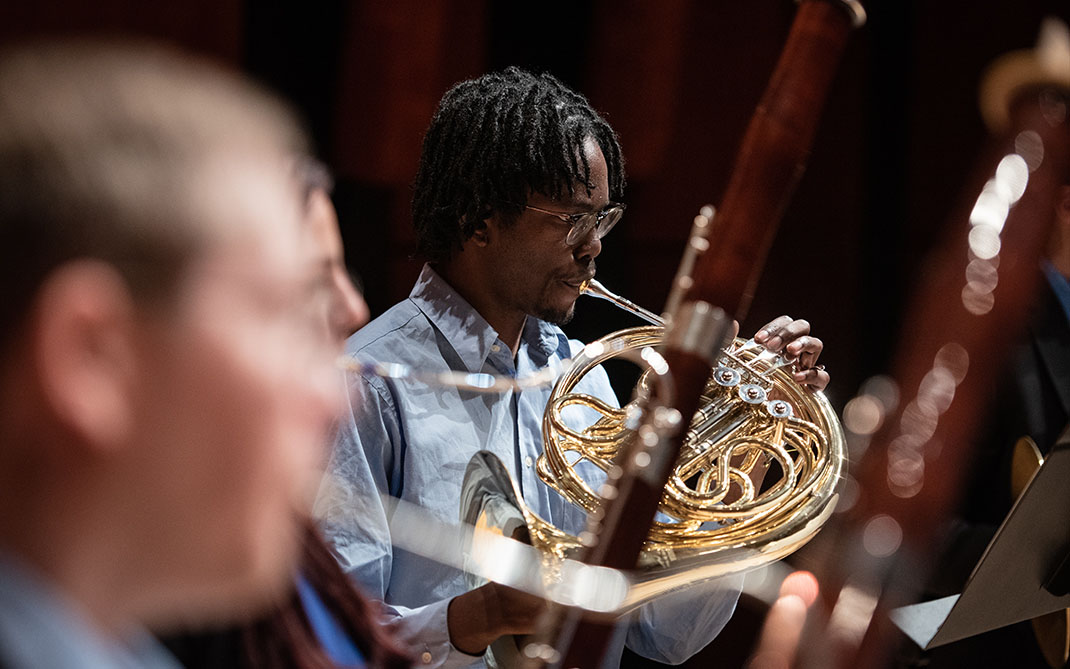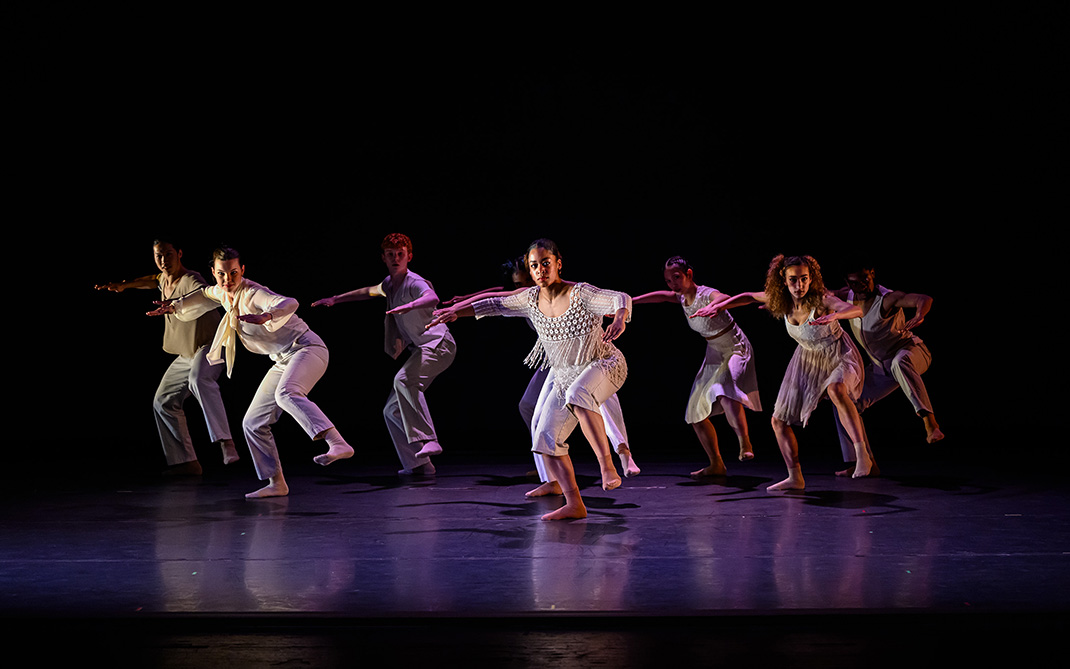UNCSA faculty are honored for excellence in teaching
Six faculty members are recipients of Excellence in Teaching Awards at the University of North Carolina School of the Arts for 2018-19, Provost David English has announced. They are Trish Casey from the School of Dance, Kate Douglass from the High School Academic Program, Janine Hawley from the School of Drama, Eric Rimes and Jason Romney from the School of Design and Production, and John Roberts from the School of Filmmaking.
At UNCSA, recipients are chosen each year from those current, full-time members of the faculty who are nominated by students, alumni and peers to receive an award. They will be honored at the University’s annual Celebration of Excellence in April.
The Excellence in Teaching Awards were established by the University of North Carolina Board of Governors in 1994 to encourage, identify, recognize, reward and support good teaching at each of its 17 constituent institutions. In the spring, one recipient from each campus will receive a System-wide teaching award from the Board of Governors. That award includes a $12,500 stipend, a commemorative bronze medallion, and recognition at commencement exercises.
“Teaching is itself an art at the School of the Arts,” English said. “It takes a special breed of educator to teach in the intense and rigorous conservatory environment. The six faculty members we honor this year are extraordinary role models for their colleagues and mentors for their students past, present and future. I congratulate each of them and I thank them for their dedication, passion and hard work.”
The recipients of the UNCSA Excellence in Teaching Awards for 2018-2019 are:
Trish Casey, School of Dance

Trish Casey is an Associate Professor in the Contemporary Dance Program.
Trish Casey joined the faculty of the UNCSA School of Dance in 1989 and currently serves as an Associate Professor in the Contemporary Dance program. She has a joint faculty appointment in the Division of Liberal Arts. As a proud alumna of both the high school and undergraduate programs at UNCSA, Casey has a long-standing relationship with the school spanning more than four decades. She declares herself to be “shaped by the wisdom, vision, practices and aesthetic values of beloved teachers along the way,” and in turn, she continues to inspire students who will impact the field for years to come.
In nominating Casey, one of her dancers wrote: “She provides the most wonderful insight into every topic we discuss, and allows us to think freely and openly. … She also cares for, and nurtures, each and every student’s individual growth. Her dedication is unparalleled, and proof of that dedication can be seen through her 30 years of educating. She is funny, engaging, and altogether phenomenal.”
Characterizing herself as a “lifelong learner with an insatiable curiosity” in her Philosophy of Teaching Statement, Casey has undertaken a Lincoln Center Education Summer Immersion Workshop, a Gyrotonics Pre-Certification Teachers Course, and work as a Level 4 Apprentice of Healing Touch, among numerous other studies. “I want students to be inspired by seeing that I am inspired, motivated because I am motivated, searching because I am searching, passionate because I am passionate, and discerning because I care to be discerning,” Casey said.
Casey earned a High School Arts Diploma and a Bachelor of Fine Arts in Contemporary Dance from UNCSA, and a Master of Fine Arts in Modern Dance from New York University’s Tisch School of the Arts. Prior to joining the faculty of UNCSA, she was a member of the Pauline Koner Dance Consort in New York City and the faculty of Southern Methodist University. She is a previous winner of the UNCSA Excellence in Teaching Award in 1997 and the UNC Board of Governors Excellence in Teaching Award in 2005.
Kate Douglass, High School Academic Program

Kate Douglass teaches Social Studies in the High School Academic Program.
In 2015, Kate Douglass joined the Social Studies faculty in the High School Academic Program, where she currently teaches Advanced Placement U.S. Government and Politics, Civics and Economics, and Advanced Civics and Economics. This past December, she earned her National Board for Professional Teaching Standards Certification, the most respected professional certification available in K-12 education.
In helping her students better understand what is necessary to be a successful citizen, Douglass said that she relies on the five core values of her teaching philosophy: “Designing and implementing engaging lessons; having a student-centered classroom; fostering a sense of responsible citizenship for all students; teaching historical thinking skills; and incorporating art and creativity into my classroom.” Her highly detailed lessons often include simulations in which students act as different groups and individuals in the U.S. government. As one student reflected in their nomination: “Civics and Economics and AP (Government and Politics) are sticky subjects when it comes to discussing opinions and views, but Ms. Douglass does a phenomenal job at keeping an unbiased tone and making the classroom a safe environment to express ourselves and hear out our classmates. (She) prepares her students excellently for every test in the classroom, prepared her AP students extremely well for their AP test, and also prepared her students for the real world.”
Douglass’ faculty colleagues offered strong comments of support, noting the inclusive nature of her classroom management and course design. One wrote, “She is miraculously able to train her students for the AP test as well as lead them to in-depth learning about the application and implications of the curriculum. The students flock to her room for help and advice and recommendations.” Another faculty member added, “She has inspired (her students) towards being active in the community by paying attention to news and politics, and by becoming active when they can.”
Douglass earned her Bachelor of Arts in History with minors in Classical Studies and Political Science from Virginia Tech University, and her Master of Arts in Secondary Social Studies Education from Wake Forest University. Prior to joining UNCSA, she served as a Social Studies teacher at North Brunswick High School in Wilmington and Hanes Magnet School in Winston-Salem. She is engaged as an Advanced Placement Reader for the AP Exam in U.S. Government and Politics.
Janine Hawley, School of Drama

Janine Hawley teaches singing in the School of Drama and is the founding director of Acting Out! community outreach program.
Janine Hawley joined the School of Drama as a faculty member in 2013, moving from a 2001 position as guest artist to adjunct status before assuming her appointment. She currently teaches singing in the School of Drama, leads the Acting for Singers course in the School of Music, and is founding director of the vibrant Acting Out! community outreach program through UNCSA’s Community Programs.
As a colleague wrote in their nomination about Hawley’s ability to integrate professional development into curriculum design and classroom teaching: “Her knowledge of the technical demands, often working with students who struggle with pitch recognition and no experience, and her enthusiasm to lead each student to their maximum potential are part of the professionalism needed to work with actors. She has taken advantage of the many opportunities (for) faculty development and Kenan Institute for the Arts grants to increase her knowledge of the musical theater repertoire, audition insight, and attendance at productions throughout the state, as well as on Broadway. She uses this insight and brings it back into the classroom to share her discoveries with the students from the first-year introduction to singing to the senior class, preparing them for the business – auditioning and professional preparedness.”
Another colleague wrote: “Janine Hawley is clearly a nurturing, engaging, challenging, and knowledgeable artist-teacher. Her compassion, kindness, and patience invigorates the training at the School of the Arts.” And her students concur. One wrote in their nomination: “Janine always knows exactly what to tell us to do in order for us to improve. She is precise and passionate. It’s evident in the classroom that she cares about and supports each and every one of us. This allows me to feel able to take risks in the room, knowing Janine will guide me when I need it.”
Hawley holds Bachelor of Music degrees in Voice Performance and Choral Music Education from Indiana University, and a Master of Arts in Voice Performance from Columbia University Teachers College. Her students regularly place in the top three in the National Association of Teachers of Singing Musical Theater auditions for the Mid-Atlantic Region. Former faculty appointments include the Hartt School, Greensboro College and Wake Forest University. She has soloed with opera companies in Washington, Philadelphia, New Orleans, New York City, Miami, Boston, and Fort Worth, among others, receiving critiques that praise her lush quality, dark timbre, technical facility and charming stage presence. Concert performances are an equally important aspect of Hawley's art; she has performed in such venues as Lincoln Center's Alice Tully Hall, Carnegie Hall and Weill Recital Hall.
Eric Rimes, School of Design and Production
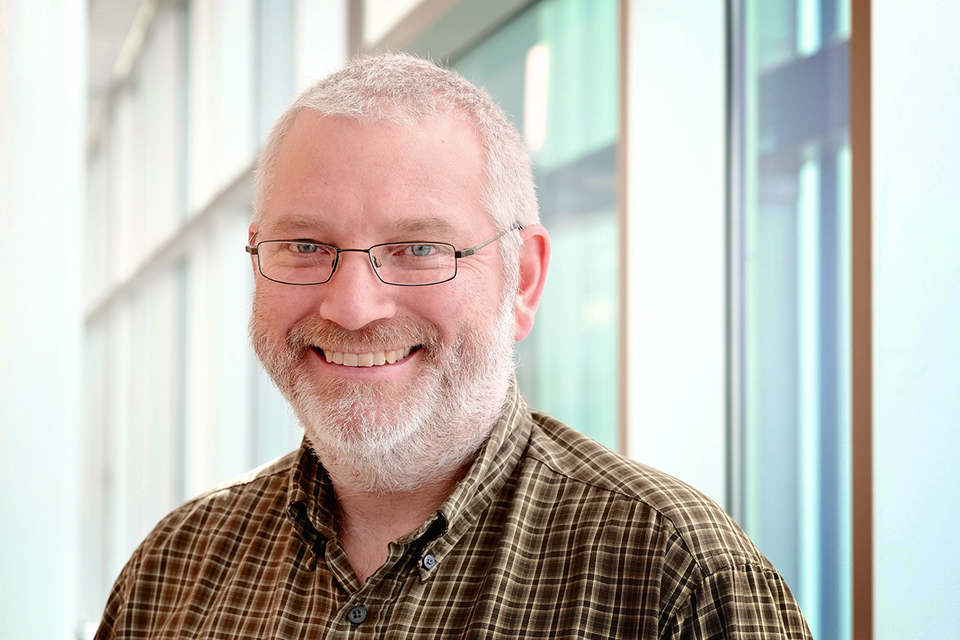
Eric Rimes is Professor of Lighting Technology in the School of Design and Production.
Eric Rimes is Professor of Lighting Technology in the School of Design and Production. He joined the faculty in 2003 and was promoted to Full Professor in the first class of this rank on the campus. In his Philosophy of Teaching Statement, he remembers his path to his chosen field started in the fourth grade: “All students auditioned for the Christmas play in order to see what part was best for them. After my audition, I was told to ‘do lights.’ Throughout middle school, high school, church and, well, everywhere I worked ‘behind the scenes.’ My first paycheck for working on lighting consoles wasn’t very much, but it sealed my desire to do this forever. Every day brings new challenges and new potential solutions.”
An impressive number of current and former students from Design and Production submitted nominations. One alumnus wrote, “Eric Rimes is an exceptional faculty member at a world-class institution. Eric provides a holistic education both inside and out of the classroom while maintaining an impressive professional career on the side. This allows him to provide his students with extremely relevant situations and training opportunities, in addition to connections and networking, that would not be otherwise possible. He provides a straightforward yet complex curriculum that well prepares students for careers in the field… He is without a doubt one of the best faculty members I have ever had contact with and deserves recognition for his hard work every day.”
Rimes also wrote: “I am passionate about what I do. Most of my work is setting up power and data systems that can be assembled and dismantled quickly and re-assembled again. Also, if any problems arise, they must be resolved easily and simply. This amounts to a large amount of problem solving and intricate planning, organization and communication. I greatly enjoy teaching people how to problem solve, plan for potential problems, organize a system so it is easy to understand, and communicate to others how the system works. It makes them better entertainment electricians, but it also makes them more employable and better at working the day to day of life in general. When I can combine my professional work and my students’ experiences, it is something special.”
Rimes earned a Bachelor of Fine Arts in Theatrical Design from Florida State University, with additional master’s level study in Technical Design and Production from the Yale University School of Drama. He is a Subject Matter Expert for the Electrics Exam of the Entertainment Technician Certification Program, which has established standardized certification for the Entertainment Electrician profession. His personal list of accomplishments in lighting technology is remarkable, with national tour work leading to creations including the Lumiere Hands in “Beauty and the Beast,” the burning wall in “Martin Guere,” and an air-cooled laser system in “Aida.” He has maintained professional involvement in the industry for his entire academic career, working on shows including “Phantom of the Opera,” “Wicked,” “Dirty Dancing,” “Flashdance,” “The Sound of Music” and “The King and I.”
John Roberts, School of Filmmaking

John Roberts is Assistant Professor of Picture and Sound Editing in the School of Filmmaking
UNCSA alumnus John L. Roberts is an Assistant Professor of Picture and Sound Editing in the School of Filmmaking, where he has served since the spring semester of 2016. In his Philosophy of Teaching Statement, he remember that his attraction to filmmaking came at an early age: “As a kid, whenever I got sick I watched “20,000 Leagues Under the Sea” in the afternoon. If I had the flu for a week, I saw it seven times. Who doesn’t like the idea of sea monsters when they’re seven? Singing seals and ships exploding was fun, but it was other things, too. … When I’m working, I still think of it all the time.”
In his nomination of Roberts, a student reflected: “Johnney Roberts has an unmatched enthusiasm for picture editing, so much so that I doubt there's a single student who hasn't left his class at some point considering becoming an editor. Not only does his excellent teaching style inspire a love and interest for his subject, he expresses a genuine care about the well-being of his students. … The end of Professor Roberts' class is always met with loud and fervent protests; it's a three-hour class, but no one wants it to end. His class is very conversation-driven. It's not just him standing at the front of the class droning on about something, it's him asking us, ‘Why does this work? Why doesn't it? If it doesn't, let's fix it.’ Everything I thought I knew about editing has been changed by his class.”
Another student added, “He has made me realize editing is more than stitching together a movie, but an art form to be cherished and respected. I went into this school not expecting to like editing at all, but I quickly realized this is a viable option all thanks to the charisma and genius manner in which Professor Roberts instructs his classes. He does not restrict you to menial work, he lets the class edit and more importantly make mistakes so we can become better filmmakers. We learn by example and by practice, two of the best ways to learn, and Roberts understand this like no other teacher.”
Roberts attended UNCSA before earning a Bachelor of Arts in Art History from University of North Carolina-Wilmington. Prior to joining the faculty at UNCSA, he worked as Picture Editor on film and television projects including “Designated Survivor,” “Code Black,” “Sleepy Hollow” and “Glee.” He was engaged as a member of the Duke Talent Identification Program (TIP) faculty in Filmmaking at Chapman University from 2008-2012.
Jason Romney, School of Design and Production
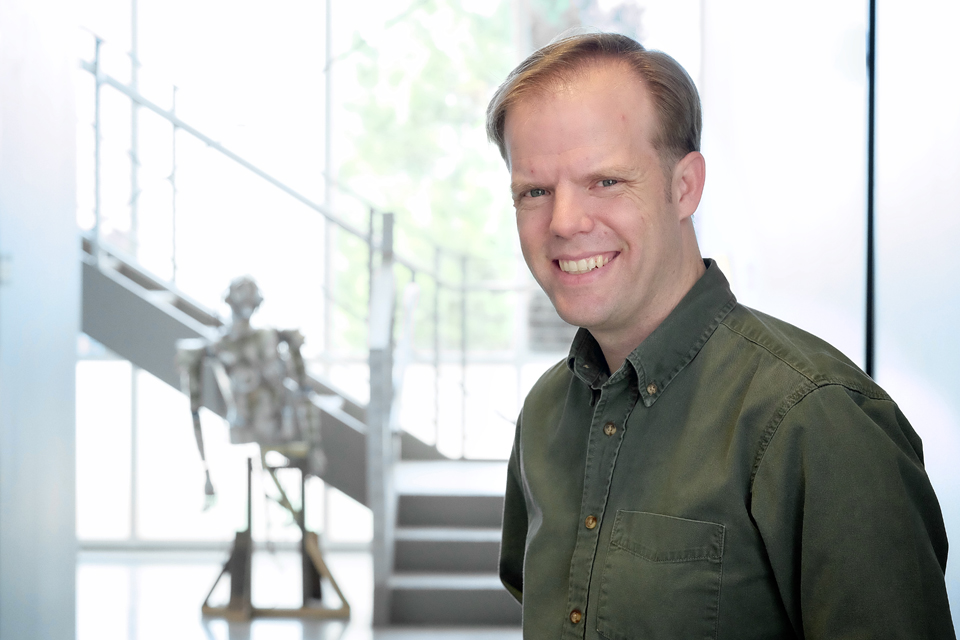
Jason Romney is Director of Sound Design and Assistant Dean of the School of Design and Production.
UNCSA alumnus Jason Romney joined the faculty in the fall of 2004 and currently serves as Professor and Director of Sound Design and Assistant Dean in the School of Design and Production. In his Philosophy of Teaching Statement, he notes: “I was acting in a play in college. During the technical rehearsals I heard some transition music that was played during one of my entrances. I remember being so distracted by that music and began analyzing what I thought the music was trying to say about the scene that I completely forgot my lines for the scene. I decided then that if I was that interested in what those people were doing out at the tech table that I should just go join them. I never looked back.”
One student who nominated Romney said: “Jason Romney is one of the most inspiring professors that I have had the pleasure of learning from in all of my years of academia. He puts his whole heart into every lesson and I always feel like I come out of his classes, or any teaching moment that he willingly and excitedly takes the time for outside of class, with a new perspective on not only the particular subject, but a new way of thinking overall. … Jason teaches Sound Design, but he also teaches self-confidence, perseverance, and that your value is about who you are as a person.” Another student offered, “His teaching is well-planned and thoughtful, on top of being absurdly knowledgeable about the subjects he teaches. He maintains professional and personal relationships with his students in a way that makes every crew call or class a joy.”
Romney says, “I find my students learn the most when they are able to work self-directed on a project that is just slightly beyond their current skill set. In that scenario, I become one of many sources of information they will utilize to learn how to complete the project. Students who know how to educate themselves are empowered for life. When the world changes, the self-educator can change with it and always remain a valuable member of society. I hope to not only teach my students the skills they need to enter today’s profession, but also prepare them to evolve as the profession evolves.”
Romney earned a Bachelor of Fine Arts in Theatre Design and Technology from Utah State University and a Master of Fine Arts in Sound Design from UNCSA. He has designed sound professionally at Children’s Theatre of Charlotte, Imagination Stage, Triad Stage, Playmakers Rep, Alliance Theatre Company, Piedmont Opera, Weston Playhouse Theatre Company, Utah Festival Opera, and others. He is also a self-taught computer programmer, developing software solutions for sound designers and engineers. His programs are used by professionals in the theater, film and music industries and in educational institutions across the country. He recently published a book, co-authored with Jennifer Burg and Eric Schwartz, entitled “Digital Sound and Music: Concepts, Applications, Science.” He was Co-Principal Investigator for a National Science Foundation Course, Curriculum, and Laboratory Improvement research grant from 2008–12.
January 23, 2019
